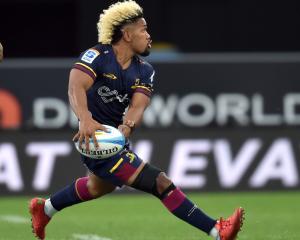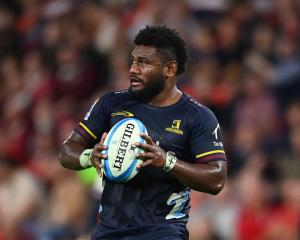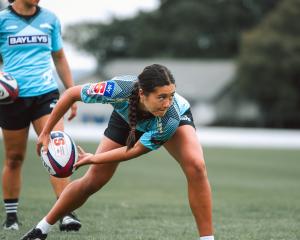In 2010, the Highlanders were effectively broke and the worst of the New Zealand teams, and a place in the playoffs appeared a million miles away. Now they are getting ready to host their first playoff game in 16 years. Rugby writer Steve Hepburn talks to general manager Roger Clark to analyse the journey that took the Highlanders from oblivion to success.
Good things happen to those who wait.
Highlanders fans have waited and waited - and now the good is coming.
General manager Roger Clark said a combination of hard work, both on and off the field, had led the Highlanders to the playoffs for the second year in a row.
Clark first got involved with the Highlanders in late 2010 as project manager, overseeing a complete overhaul of the business. The side was going nowhere, there was flagging public interest and most good players gave the side a cold shoulder.
Clark had a look on behalf of the New Zealand Rugby Union and was then appointed general manager of the franchise.
His opening moves were to appoint Jamie Joseph as coach and separate the organisation from the Otago Rugby Football Union.
''That meant we could concentrate on our core business - running the Highlanders, selling tickets and getting sponsorship. Us and the Chiefs were the first ones to do it and the others are still catching up,'' Clark said.
''Plus the salary budgets became closer and the contracting model changed. That meant we could sign players for two to three years. That brings continuity to a team and everyone knows that is what a team needs.
''Previously administrators didn't know who they would have from one season to the next. That would be hopeless. But now you look round here and we've had guys for a long time now. Nasi [Manu] has been with us for six years. Lima [Sopoaga], Ben [Smith] - they have all been here for a while.''
Clark said the salary budget changes meant the Highlanders could match offers for good players.
''We'd been miles away. We were millions behind - four to five million behind. But now we could get closer. We're still behind but we can compete.''
Clark said the franchise's strategy was to get good people in the right place, all working together for the same goal.
''You get 40 guys and then 10 in the management team. You've got to have something that binds them together. Everyone is part of a big family. You are all in this together.
''Sure, this is professional sport, so you're always going to have egos, but you need people to fit into that culture.
''I think Dunedin helps with that. Everything is only 10 minutes away. Players feel part of the community. Just growing that camaraderie - that might give players an extra 1% out on the field. These little things, they do count for a bit.
''People are the key. You've got to have the right dynamic. I think we got that right with the coach. I've always rated Jamie as a coach. And he is a lot better coach now than when he first arrived.''
Clark said the 2013 season, during which the Highlanders signed some big names, only to fall to second-last on the table, was due to the organisation making mistakes.
''We sacrificed our strategies for some opportunities - fast-tracking what we were trying to do. We got a couple of key players and thought that was the way to go.
''But it didn't work. Plus that was the year we had lost two experienced coaches in Kieran Keane and Simon Culhane, and our manager, Leicester Rutledge. We had two new coaches and a new manager.''
Clark said in that year there was never a thought of getting rid of Joseph.
''I think we've got to be mindful of our coaches. They work incredibly hard.''
The Highlanders bounced back the following year, making it to the playoffs for the first time in 12 years, and they have repeated the dose this season.
A boost in coaching resources - Clarke Dermody joined as a set-piece coach - had helped, Clark said.
''In 2010, we had two coaches. Now everyone has got five. You are looking after 40 players so you need the coaches. We've managed to build the revenue streams so we've been able to afford the management structure.''
Two new captains emerged from the ashes of the failed 2013 season, and Clark paid tribute to the work done by Nasi Manu and Ben Smith.
''I think part of the culture down here is a bit old school. And although we haven't gone completely away from that, you've got to find that balance between performance and having fun. I think credit has to go to the leadership of the team. They have grown so much in the past two years.''
The Highlanders have also become a home for strays and misfits. Players who do not fit in at one franchise - names such as Malakai Fekitoa and Waisake Naholo come to mind - have blossomed in the South.
Clark said it did not happen by accident.
''You've got to have the ability to know what to look for. The coaches do their due diligence. They literally spend hours and hours looking at tape on players. They have all the statistics. Plus you need to have the knack of seeing what you can get out of a player.
''Our guys have been doing it for five years now. You look at someone like Aaron Smith. He was spotted by Jamie early on and that is a case of selecting a player and thinking what he could be.''
Smith went on to the All Blacks and Clark hopes he is joined by a few more from the Highlanders.
''That is what in the end we are set up to do - provide the platform for the players to go on and be All Blacks. We've had a few, and over the next couple of years I think we'll get a few more.''










